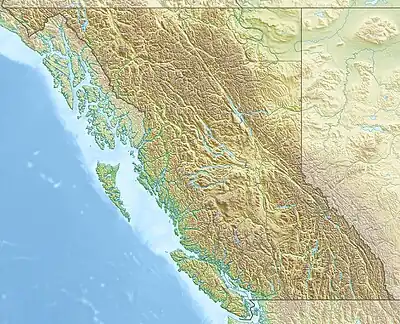| Lost Creek | |
|---|---|
 Mouth of Lost Creek | |
| Location | |
| Country | Canada |
| Province | British Columbia |
| District | Cassiar Land District |
| Physical characteristics | |
| Source | Level Mountain |
| • location | Nahlin Plateau |
| • coordinates | 58°33′8″N 131°24′55″W / 58.55222°N 131.41528°W[1] |
| • elevation | 1,687 m (5,535 ft)[2][3] |
| Mouth | Koshin River |
• coordinates | 58°39′53″N 131°42′11″W / 58.66472°N 131.70306°W[4] |
• elevation | 937 m (3,074 ft)[2] |
| Length | 26 km (16 mi)[5] |
| Basin size | 70.0 km2 (27.0 sq mi),[6] |
| Discharge | |
| • average | 1.07 m3/s (38 cu ft/s)[6] |
| Basin features | |
| Topo map | NTS 104J12 Dudidontu River NTS 104J11 Granite Lake |
Lost Creek is a tributary of the Koshin River in northwest part of the province of British Columbia, Canada.[4][7] It flows generally northwest for roughly 26 km (16 mi)[5] to join the Koshin River just north of Hatin Lake,[8] and about 4 km (2.5 mi) north of Callison Ranch.[9] Lost Creek's watershed covers 70.0 km2 (27.0 sq mi),[6] and its mean annual discharge is estimated at 1.07 m3/s (38 cu ft/s).[6] The mouth of Lost Creek is located about 90 km (56 mi) north of Telegraph Creek, British Columbia, about 102 km (63 mi) west of Dease Lake, British Columbia, and about 163 km (101 mi) east of Juneau, Alaska. Lost Creek's watershed's land cover is classified as 46.3% shrubland, 31.5% conifer forest, 12.2% barren, and small amounts of other cover.[6]
Lost Creek is in the traditional territory of the Tlingit Taku River Tlingit First Nation[10][11] and the Tahltan First Nation, of the Tahltan people.[12]
Geography
Lost Creek originates on the north side of the massive Level Mountain shield volcano, near the headwaters of Kaha Creek and Matsatu Creek, about 8 km (5.0 mi) north of Meszah Peak, the highest peak of the Level Mountain Range, a cluster of bare peaks on the summit of Level Mountain. The creek flows north and northwest, first through Level Mountain's high and relatively barren lava plateau, then through rugged forested terrain. In its final 2 km (1.2 mi) Lost Creek enters the Koshin River's floodplain. It empties into the Koshin River in the wetlands along the river north of Hatin Lake. The historic Yukon Telegraph Trail, following the Koshin River, crosses Lost Creek near its mouth.[3][13]
See also
References
- ↑ Derived from BCGNIS, topographic maps, and Toporama
- 1 2 Elevation derived from ASTER Global Digital Elevation Model, using GeoLocator, BCGNIS coordinates, and topographic maps.
- 1 2 "Toporama (on-line map and search)". Atlas of Canada. Natural Resources Canada. Retrieved 26 August 2021.
- 1 2 "Lost Creek". BC Geographical Names.
- 1 2 Length measured using BCGNIS coordinates, topographic maps, and Toporama
- 1 2 3 4 5 "Northwest Water Tool". BC Water Tool. GeoBC, Integrated Land Management Bureau, Ministry of Agriculture and Lands, Government of British Columbia. Retrieved 26 August 2021.
- ↑ "Lost Creek". Geographical Names Data Base. Natural Resources Canada.
- ↑ "Hatin Lake". BC Geographical Names.
- ↑ "Callison Ranch". BC Geographical Names.
- ↑ "Wóoshtin yan too.aat Land and Resource Management and Shared Decision Making Agreement ('G2G Agreement')" (PDF). Taku River Tlingit First Nation. 2011. Retrieved 26 August 2021.
- ↑ "Wooshtin Wudidaa Atlin-Taku Land Use Plan" (PDF). Taku River Tlingit First Nation. 19 July 2011. Retrieved 26 August 2021.
- ↑ "Our Territory". Tahltan Central Government. Retrieved 26 August 2021.
- ↑ Mussio, Russell; Mussio, Wesley (2018). Northern BC Backroad Mapbook. Mussio Ventures. p. 96. ISBN 978-1-926806-87-7. Retrieved 26 August 2021.
External links
- "Atlin-Taku Planning Area: Sensitive Wildlife Areas" (PDF). Taku River Tlingit First Nation.